新概念英语第一册第45课Lesson45课文单词知识点讲解学习
- 格式:doc
- 大小:83.50 KB
- 文档页数:3
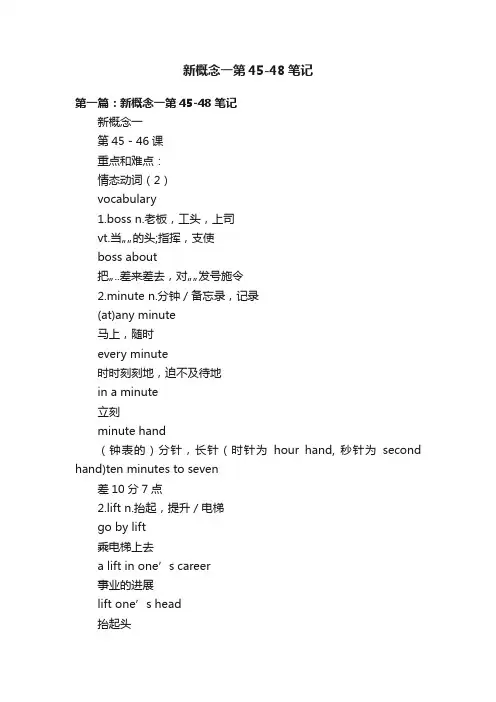
新概念一第45-48笔记第一篇:新概念一第45-48笔记新概念一第45-46课重点和难点:情态动词(2)vocabulary1.boss n.老板,工头,上司vt.当……的头;指挥,支使boss about把…..差来差去,对……发号施令2.minute n.分钟/备忘录,记录(at)any minute马上,随时every minute时时刻刻地,迫不及待地in a minute立刻minute hand(钟表的)分针,长针(时针为hour hand, 秒针为second hand)ten minutes to seven差10分7点2.lift n.抬起,提升/电梯go by lift乘电梯上去a lift in one’s career事业的进展lift one’s head抬起头lift up one’s ears竖起耳朵听4.cake n.蛋糕,糕饼或蛋糕a cake of soap一块肥皂a cake of mud一块泥土an ice cake冰块a potato cake土豆饼5.biscuit n.饼干/软烤小圆饼take the biscuit中头奖;出人意料的好(或坏)Key structures:1.Can you come here a minute please, Bob?请你过来一下好吗?PS: a minute 一会儿,不能译成“一分钟”,在句中作状语,相当于:Can you come here for a while please, Bob?2.She’s next door.她在隔壁。
Next door起副作用,作表语,意为隔壁。
3.The boss’s handwriting is terrible!Boss’s是名词所有格,主义其读音。
类似如:Tom’s shoes(汤姆的鞋),Xiao Wang’s company(小王的公司)。
Handwriting书写,是一个抽象名词,只能当作单数使用。
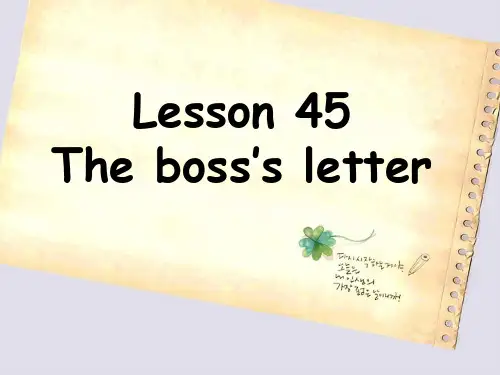
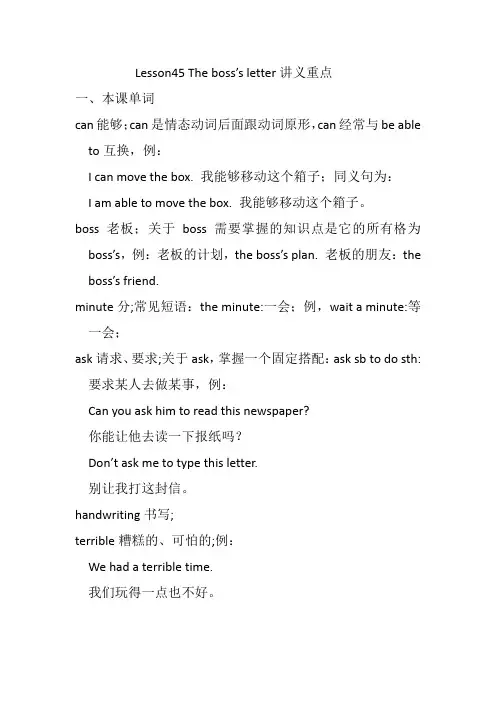
Lesson45 The boss’s letter讲义重点一、本课单词can能够;can是情态动词后面跟动词原形,can经常与be able to互换,例:I can move the box. 我能够移动这个箱子;同义句为:I am able to move the box. 我能够移动这个箱子。
boss 老板;关于boss需要掌握的知识点是它的所有格为boss’s,例:老板的计划,the boss’s plan. 老板的朋友:the boss’s friend.minute分;常见短语:the minute:一会;例,wait a minute:等一会;ask请求、要求;关于ask,掌握一个固定搭配:ask sb to do sth:要求某人去做某事,例:Can you ask him to read this newspaper?你能让他去读一下报纸吗?Don’t ask me to type this letter.别让我打这封信。
handwriting书写;terrible糟糕的、可怕的;例:We had a terrible time.我们玩得一点也不好。
二、本课重要知识点1. What is the matter?怎么了?这是新概念英语中非常重要的一个知识点,经常用来询问人和事物的状况,常作“怎么了”“是否有问题”“是否有麻烦讲”,可单独使用也可跟with一起联合使用,掌握以下三点即可:①单独使用时相当于汉语的“怎么了”例:What is the matter?怎么了?I lost my keys. 我钥匙丢了。
②What is the matter with:、、、、怎么了?What is the matter with the machine?这台机器怎么了?③What is wrong with:、、、怎么了?What is wrong with you?你怎么了?What is the matter? 与what is wrong?这两个句型所要表达的意思基本相同,可以互换,多见于同义句转换,例:What is the matter with you?(同义句转换)What is wrong with you?你怎么了?2. Can you come here a minute please?请你来一下好吗?在本句中我们继续上节课的情态动词的用法总结。
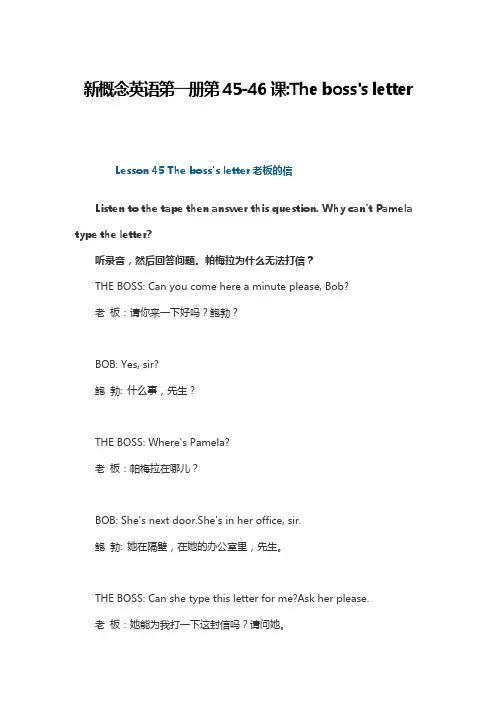
新概念英语第一册第45-46课:The boss's letterLesson 45 The boss's letter老板的信Listen to the tape then answer this question. Why can't Pamela type the letter?听录音,然后回答问题。
帕梅拉为什么无法打信?THE BOSS: Can you come here a minute please, Bob?老板:请你来一下好吗?鲍勃?BOB: Yes, sir?鲍勃: 什么事,先生?THE BOSS: Where's Pamela?老板:帕梅拉在哪儿?BOB: She's next door.She's in her office, sir.鲍勃: 她在隔壁,在她的办公室里,先生。
THE BOSS: Can she type this letter for me?Ask her please.老板:她能为我打一下这封信吗?请问她。
BOB: Yes, sir.鲍勃: 好的,先生。
BOB: Can you type this letter for the boss please, Pamela? 鲍勃: 请你把这封信给老板打一下可以吗,帕梅拉?PAMELA: Yes, of course I can.帕梅拉:可以,当然可以。
BOB: Here you are.鲍勃: 给你这信。
PAMELA: Thank you, Bob.帕梅拉:谢谢你,鲍勃。
PAMELA: Bob!帕梅拉:鲍勃!BOB: Yes?What's the matter.鲍勃: 怎么了?怎么回事?PAMELA: I can't type this letter.帕梅拉:我打不了这封信。
PAMELA: I can't read it!帕梅拉:我看不懂这封信,The boss's handwriting isterrible!老板的书写太糟糕了!New Word and expressions生词和短语canmodal verb 能够bossn. 老板,上司minuten. 分(钟)askv. 请求,要求handwritingn. 书写terribleadj. 糟糕的,可怕的Notes on the text课文注释1 Can you come here a minute please, Bob?句中的can是情态动词,表示“能力”。
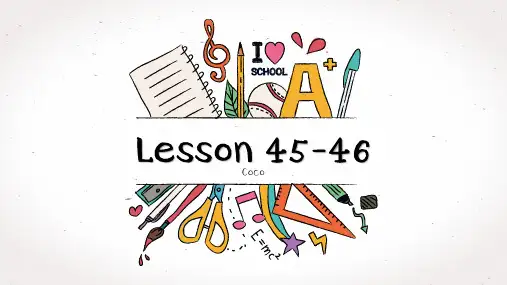
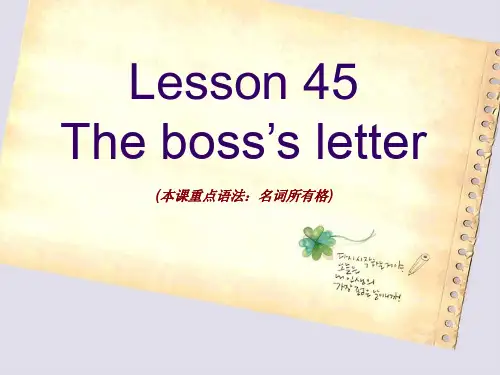

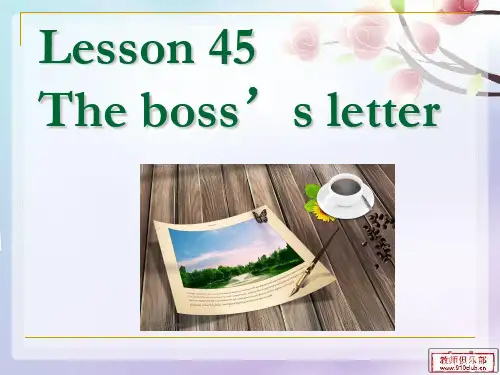
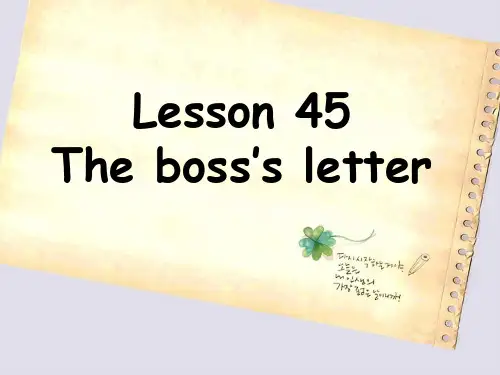
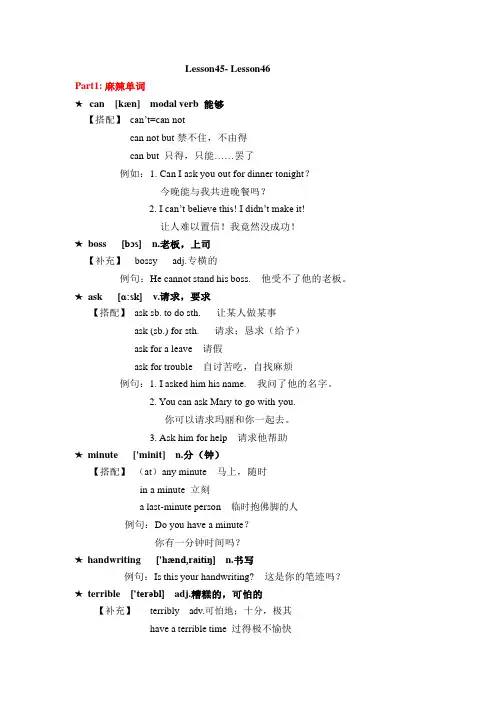
Lesson45- Lesson46Part1: 麻辣单词★can [kæn] modal verb 能够【搭配】can’t=can notcan not but 禁不住,不由得can but 只得,只能……罢了例如:1. Can I ask you out for dinner tonight?今晚能与我共进晚餐吗?2. I can’t believe this! I didn’t make it!让人难以置信!我竟然没成功!★boss [bɔs]n.老板,上司【补充】bossy adj.专横的例句:He cannot stand his boss. 他受不了他的老板。
★ask [ɑ:sk]v.请求,要求【搭配】ask sb. to do sth. 让某人做某事ask (sb.) for sth. 请求;恳求(给予)ask for a leave 请假ask for trouble 自讨苦吃,自找麻烦例句:1. I asked him his name. 我问了他的名字。
2.You can ask Mary to go with you.你可以请求玛丽和你一起去。
3.Ask him for help 请求他帮助★minute ['minit] n.分(钟)【搭配】(at)any minute 马上,随时in a minute 立刻a last-minute person 临时抱佛脚的人例句:Do you have a minute?你有一分钟时间吗?★handwriting ['hænd,raitiŋ]n.书写例句:Is this your handwriting? 这是你的笔迹吗?★terrible ['terəbl]adj.糟糕的,可怕的【补充】terribly adv.可怕地;十分,极其have a terrible time 过得极不愉快例句:It’s so terrible! 真糟糕!★ lift [lift]v.拿起,搬起,举起 【补充】 n. 电梯go by lift 乘电梯上去lift one’s head 抬起头lift up one’s ears 竖起耳朵听例句: I can lift this table. 我能举起这个桌子。

Lesson45 The boss’s letter 一、单词分类;二、课文复习三、课文重点四、词组五、语法解析情态动词can情态动词用来表达人的情感、态度,不能单独使用,后跟动词原形,没有数、人称、时态的变化情态动词有:必须must 禁止mustn’t 需要need能,会,可以can 可能,可以(婉转)may can的用法:1. 能,会,表能力句型转换:肯定句:主语+ can + 动词原形否定句:主语+can’t + 动词原形一般疑问句:Can + 主语+ 动词原形?特殊疑问句:特殊疑问词+ can +主语+其他?对人提问用:who对物提问用:what对地点提问用:where对动词提问用:(do) what肯定句:I can see an orange on the plate.否定句:I can’t see an orange on the plate.一般疑问句:Can you see an orange on the plate?My father can cook well in my family.对划线部分提问:Who can cook well in your family?My father can cook well in my family.对划线部分提问:What can your father do well in your family?I can find my pencil in the desk.对划线部分提问:Where can you find your pencil?2.可以,表请求,常用于疑问句中如:Can I ... ? 或Can you ...( for me)?肯定回答用:Sure. / Of course. / No problem. / OK.否定回答用:Sorry, I can’t. / Sorry, I have no time.---Can I ...?---Yes, you can . / No, you can’t .---May I ...?---Yes, you may . / No, you mustn’t / can’t . ---Must I ...?---Yes, you must . / No, you needn’t .---Need I ...?---Yes, you need . / No, you needn’t .练习( A ) 1. ---May I take this book out?---No, you .A. can'tB. may notC. needn'tD. aren't ( B ) 2. You go and see a doctor at once because you've got a fever.A. canB. mustC. dareD. would ( B ) 3. ---Can you speak Japanese?---No, I .A. mustn'tB. can'tC. needn'tD. may not ( C ) 4. The children play football on the road.A. can’tB. canC. mustn'tD. must ( B ) 5. ---Can you speak Japanese?---No, I .A.mustn’tB. can’tC. needn’tD. may not五、单词填空1.Tom! Your bed is very untidy. Can you make the bed?2. The weather is terrible . Let's stay at home.3. Wait a minute . I'll be back soon.4. I can't read this letter. His handwriting is terrible.5. The thing that can take us up and down is called a lift .6. Lift the heavy box for me, please!7. My mother is making b iscuits now. It smells good.8. Go back to work. Our boss is looking at us.六、语法练习1. 模仿例句改写以下句子He is taking his book. He can take his book.She is putting on her coat. She can put on her coat.1. They are typing these letters. They can type these letters.2. She is making the bed. She can make the bed.3. You are swimming across the river. You can swim across the river.4. We are coming now. We can come now.5. We are running across the park. We can run across the park.6.He is sitting on the grass. He can sit on the grass.7. I am giving him some chocolate. I can give him some chocolate.2.模仿例句提问并回答。
新概念英语第一册第45课L e s s o n45课文单词知识点
精品文档
【知识点讲解】
今天我们来简单了解一下情态动词这个语法点。
英语中有一类动词,它们本身带有一定的词义,但是不可以单独作为谓语使用,要和其他动词的原型配合起来构成谓语。
这类动词就叫情态动词。
情态动词的数量很少,主要有:
can (could), may (might), must, need, ought to, dare (dared), shall (should), will (would) . 在这里,我们只学习第一个 Can.
can 可以表示主语的能力。
比如:I can play piano. 我能弹钢琴 / 我会弹钢琴。
Lesson45
THE BOSS: Can you come here a minute please, Bob?
BOB: Yes, sir?
THE BOSS: Where's Pamela?
BOB: She's next door. She's in her office, sir.
THE BOSS: Can she type this letter for me? Ask her please.
BOB: Yes, sir.
BOB: Can you type this letter for the boss please, Pamela?
PAMELA: Yes, of course I can.
BOB: Here you are.
PAMELA: Thank you, Bob.
PAMELA: Bob!
BOB: Yes? What's the matter.
PAMELA: I can't type this letter. PAMELA: I can't read it!
The boss's handwriting is terrible!
老 板:请你来一下好吗?鲍勃? 鲍 勃: 什么事,先生? 老 板:帕梅拉在哪儿? 鲍 勃: 她在隔壁,在她的办公室里,先生。
老 板:她能为我打一下这封信吗? 请问她。
鲍 勃: 好的,先生。
鲍 勃: 请你把这封信给老板打一下可以吗,帕梅拉? 帕梅拉:可以,当然可以。
鲍 勃: 给你这信。
帕梅拉:谢谢你,鲍勃。
帕梅拉:鲍勃! 鲍 勃: 怎么了?怎么回事? 帕梅拉:我打不了这封信。
帕梅拉:我看不懂这封信, 老板的书写太糟糕了!
精品文档
也可以表示请求和许可,比如文中的 Can she type this letter for me? 询问的不是她会不会打字,而是她可不可以帮我打字?
大家也可以对比一开始我们讲的来观察这两个句子:can不能单独使用,所以在第一个例句中它和play连用:can play 来表示“我会弹钢琴。
”
情态动词的否定式由情态动词+not 表示,所以“我不会弹钢琴”翻译为:I cannot/can't play piano.
疑问句形式把情态动词提前变为:Can you play piano?。